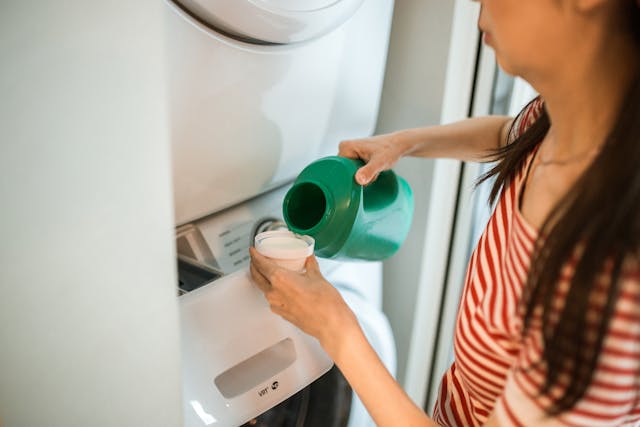
Reduce the amount of laundry detergent you use
The Environmental Benefits of Using Less Laundry Detergent
Doing laundry is a part of everyday life, but what many people don’t realize is that the amount of detergent we use has a direct impact on the environment. More often than not, we pour in far more detergent than necessary—either out of habit, misunderstanding, or the belief that “more soap means cleaner clothes.” In reality, most clothes simply don’t need that much detergent to get clean, and cutting back can yield surprising environmental benefits.
1. Less Detergent = Less Water Pollution
Laundry detergents contain surfactants, phosphates, fragrances, and other chemical additives. When these chemicals wash down the drain, they don’t just disappear. Even with modern water treatment systems, some residues end up in natural waterways where they can cause harm to aquatic ecosystems. Phosphates in particular can lead to algae blooms, which deplete oxygen in water and kill fish and other marine life.
By reducing how much detergent we use, we decrease the concentration of these harmful chemicals entering rivers, lakes, and oceans. The fewer suds we create, the less the planet has to absorb.
2. Overuse Can Damage Clothes and Machines
It’s easy to assume more soap equals better results, but excess detergent can actually make clothes dirtier. Too much detergent creates extra suds that don’t rinse out completely, trapping dirt and bacteria in fabrics and leaving behind residue that dulls colors and irritates skin. It also forces washing machines to work harder to rinse out the excess, leading to more water and energy use.
When you use only what’s needed—or even less—you’re helping your machine run more efficiently and extending the life of your clothing, reducing the frequency with which items need to be replaced. That means fewer clothes going to landfills and less manufacturing pollution from the textile industry.
3. Reduced Packaging Waste
Using less detergent over time means you buy less frequently. That translates to fewer plastic jugs and cardboard boxes being produced, transported, and thrown away. It also helps shrink your household’s carbon footprint—detergent packaging takes energy to manufacture and creates waste that often ends up in landfills or as plastic pollution.
Better yet, switching to concentrated or powdered detergent—especially those sold in minimal or compostable packaging—helps you skip the plastic entirely and further cuts down your impact.
4. Saves Energy and Water
Overuse of detergent leads to more rinse cycles, either because you select an extra rinse manually or because your high-efficiency washer senses the need to remove excess suds. That’s more energy and water consumed, and the carbon emissions tied to that usage add up across millions of households.
By dialing back detergent use, you allow your machine to clean more efficiently and reduce the environmental costs of your laundry routine.
5. Most Loads Don’t Need a Full Dose
Unless your clothes are heavily soiled—like gym wear, outdoor gear, or baby items—most everyday laundry just doesn’t need a full scoop or capful of detergent. Light wear, office clothes, and sleepwear often only need a fraction of the recommended amount. In fact, many manufacturers overstate how much to use to encourage quicker product turnover.
A good rule of thumb: start with half of what the label suggests, and adjust only if necessary.
6. Dryers Disinfect Better Than Washing
Most household dryers, when set to high heat (130–160°F or 54–71°C) and run for at least 30–40 minutes, can kill most bacteria, viruses, dust mites, and even bed bugs.
- This includes pathogens like E. coli, staph, and influenza viruses.
- The longer and hotter the cycle, the more effective it is at disinfecting fabrics.
Cold or Warm Washing Cycles:
- Regular washing, especially in cold or warm water (below 140°F / 60°C), is not guaranteed to disinfect.
- It removes dirt and germs, but doesn’t always kill them.
- Hot water (above 140°F / 60°C) can disinfect more effectively, but many home machines don’t reach those temperatures unless set explicitly or have a sanitize cycle.
Small Changes, Big Impact
Switching to a more sustainable laundry habit doesn’t require an overhaul of your routine—just a more mindful approach. By using less detergent, you’re:
- Preventing chemical pollution in waterways
- Conserving water and energy
- Creating less plastic waste
- Protecting your clothes and washing machine
- Saving money in the process
Every load of laundry is a chance to make a better choice for the planet. And sometimes, doing less is exactly what’s needed.